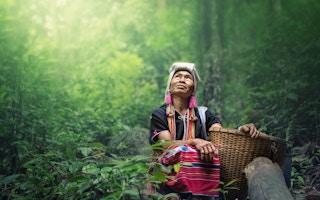The world’s governments have committed to end deforestation by 2020 and many global companies are following suit by making their supply chains deforestation free. But what happens in areas where global businesses are absent? And what role can small and medium enterprises play in solving deforestation?
Nepal is a clear example. When the rhododendron forests of the Sacred Himalayas are in full bloom, there are few more beautiful forests; and few that are more important for biodiversity as habitat for species such as the red panda, tiger and leopard.
Nevertheless many of these forests are at threat from clearance for firewood, terraced agriculture and overgrazing and only a fraction of their value is being realised by local communities.
With poor infrastructure and few roads, Nepal’s mountains are not fertile ground for international companies. But these regions are rich with small business. Nepal has over 40,000 micro-enterprises, two-thirds of which are linked to timber, non-timber forest products (NTFPs), ecosystem services and ecotourism.
Many are run by women and few are connected to wider markets. Can these be both more profitable and more sustainable?
The Mountain Institute, WWF and business innovation company Ennovent have joined forces to look at this question in relation to medicinal and aromatic plant production.
Since 2001, The Mountain Institute has increased the income of over 15,000 farmers through training and supporting the sustainable cultivation of plants such as Chiraito (Swertiya chirayita), Lothsalla (Taxus wallichiana), Satuwa (Paris Polyphylla), and Seto Bikhuma (Aconitum ferox A. spicatum).
The partnership will now help farmers to secure certifications for organic production, quality processing and for forest management – including in the buffer zones of national parks. It aims to improve the effectiveness of value chains and strengthen linkages to the profitable global cosmetic and pharmaceutical markets.
Medicinal plant production is currently a million dollar industry for Nepal – but could produce many times this value while also more directly protecting the environment.
Examples like this from across Asia are examined in a new report entitled “Impact in the Forest”. Using case studies from landscapes in Vietnam, Indonesia and Nepal, the report explores pathways to unlock business solutions for deforestation free trade chains in Asia.
It found that while few enterprises are directly contributing to reducing pressure on deforestation, there is a strong foundation of forest related enterprises that can be scaled to deforestation free. Greatest potential was identified in rubber, cocoa, rattan, essential oils, medicinal plants and low carbon technologies.
One key obstacle is clearly government policies which routinely continue to incentivise deforestation. But a surprising conclusion was also that the prevalence of donor funds is often dampening private sector innovation and retarding the search for market based solutions.
Public sector investments can be counterproductive if delivered contrary to the logic of business. A better understanding is needed of how public sector finance can be used to positively support private sector growth.
“
While few enterprises are directly contributing to reducing pressure on deforestation, there is a strong foundation of forest related enterprises that can be scaled to deforestation free.
The report recommends a focus on building an ecosystem of support services for deforestation free supply chains and green businesses in countries and landscapes. This might include financing innovation challenges, supporting incubator hubs, creating market places for innovation agents and investors and making available business development services.
Nepal may seem a unique case because of its mountainous terrain, but in fact the same story repeats itself in many parts of rural Asia – whether it is with smallholder rubber or cocoa producers in Indonesia or plantation businesses in Vietnam and Laos.
The creation of forest friendly business at large or small scale is an undertaking that has barely begun, but is one that could create great social, economic and environmental value for Asia if approached smartly.
The “Impact in the Forest” report is the product of a collaboration between five organisations from very different sectors – WWF on the environment, Ennovent on business innovation, the Impact Hub on entrepreneur incubation, Clarmondial on financing for sustainable development and Greenworks Asia on sustainability services.
Paul is the founder and lead of WWF’s Landscape Finance Lab. This post is republished from the WWF blog with permission.











